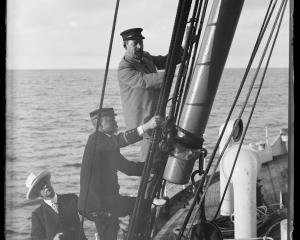
Where are they now is a question rarely asked in the racing industry.
Once most people start working in the game, they simply never stop.
A combination of the camaraderie, the horses and the exciting atmosphere means anyone who has stepped out of the spotlight can be found not far from it.
That is certainly the case for famed Wingatui trainer Hec Anderton.
Unlike most trainers who will be working horses until the last day they are on earth, Anderton made a conscious decision to step away from training.

His decision to retire was mainly so his late son, Steve, could step out from the shadow of the pair’s training partnership.
"I had two reasons for retiring and one of them was to see what the other side of the coin looked like."
"I reckon as long as I was standing beside him I was going to be getting the accolades which he richly deserved.
"I did not want to be standing in his way.
"I walked out of that stable and left everything there ... and said ‘it’s your go now, boy’."
The father and son had trained 88 winners in partnership before Steve took over.
Steven tried to lure his father back into helping out, but Hec soon put an end to that idea.
"He wanted me to come down and muck out the stables.
"The first job I did was muck out stables and it was not going to be the last, too!"
That left Hec to enjoy his retirement until tragedy struck his family in March of 2015. Steve died in hospital following an accident involving a horse truck. Afterwards, Anderton returned to
training for a brief period in partnership with Steve’s wife, Claire.
Anderton then stood back again, to allow Claire, a highly skilled horsewoman, to run the operation.
As much as he is enjoying retirement, Anderton admits he does miss working with horses, especially when a fast one enters Claire’s stable.
He did some of the ground work with star filly The Precious One when Claire was out of action through injury and he got the buzz he had been missing.
"Gee, I enjoyed it.
"I broke her in and I wanted the Dennis boys [noted Woodlands breeders Joe, Martin, Ray and Tony Dennis] to name her The Gee One."
"They said what does that mean and I said the group one and if this filly can’t win one I will be damned.
"She is a very good filly, gee she is."
For those not immersed in racing, "group one" refers to prestige, high-stakes races.
That endorsement means a lot, given Anderton knows a thing or two about good horses. The former trainer has seen plenty in his time and has won a string of feature and group races. However, the choice of horse he rates as the best he has trained might surprise some.
He puts Mellseur, a tough group one-winning mare of the late 1970s and early 1980s, on top.
The Causeur-Queen Mellay mare has the race now known as the Thorndon Mile at Trentham at the top of her CV.
The victory was one of many feature races, from one end of the country to the other, including the Thames Valley Stakes and George Adams Handicap at Riccarton and two South Island Breeders’ Stakes at Orari.
"I would lean towards her being the best horse I trained — but it is hard to decide from horses from so far apart [in time].
"But Mellseur was the top weight-for-age mare in the country of her year.
"She was an extremely good horse."
Anderton rated Mellseur slightly ahead of The Jewel despite the latter winning two group one races and being desperately unlucky not to win more. The horse’s infamous defeat in the Queensland Oaks was among them.Anderton was exceptionally successful in five trips to Australia, winning 10 races on eight tracks. They included listed races at Caulfield and Moonee Valley with Native Monarch.
With a famous name like Anderton, it would be easy for the younger generation of racing fans to think that Hec’s path to becoming a highly successful trainer was paved with gold.
But that was certainly not the case.
Like many of his era, he started as a jockey, signing up as a probationer at the age of just 12. After success in the saddle, weight eventually got the better of Anderton who started training in partnership with his father, Hector. Though they had success, the father-and-son combination did not click and it ended. Anderton then worked at the local brick works, freezing works and ran his own horse transport business.
The time on the road would not have made for a good family life with his wife, Pat, so Anderton eventually sold the business.
His pathway to training came when he suggested to Roger Grey, a friend of his father’s, that he buy a yearling colt at a Wingatui sale.
On hearing of the colt’s purchase, Anderton senior advised Grey that his son should train the horse.
Fast forward to now and Anderton has left the training ranks with more than 350 wins to his name, either in partnership with his son or father or in his own name.
Time away from being an officially licensed trainer gives Anderton the opportunity to compare racing of yesteryear with today’s meetings with a unique perspective. He hold no grudges towards the game that has been good to him and had to be pushed to reveal where he thought racing could do better.
"What we can say is we are not going forward. There is not one problem, but many, many problems."
And he is certain the number of quality trainers and riders is not there today.
"We are desperate for jockeys and apprentices.
"They [racing’s governing body] have started something which I think is a good idea which is going around the pony clubs and getting those kids involved."
That has a big impact on one aspect of the game Anderton cherishes.
The Great Northern Steeplechase-winning trainer has a soft spot for jumping horses. And he is only too aware of how the lack of local jumps riders is having a detrimental impact on the sport in the South. Anderton also contends that the harness racing code has surpassed thoroughbred racing in some areas — especially in formulating racing programmes.
The former trainer also says some of the incidents in which horses are seen to slip while racing can be attributed to modern shoeing.
Worn aluminium plates do not offer the traction a racing plate fitted the day before the race does, which was earlier a standard practice.
"If the horses were going away on Saturday, they were plated on Friday and they all had brand new nails, whereas aluminum plates, they haven’t got a grip."
Enticing people to continue breeding and racing horses, as more people used to do, is another challenge for the industry.
Stakes need to be competitive to offset owners paying training fees; if they are not, then syndicating horses becomes an impossibility.
"Our breeding industry is strong, so the horses are here.
"The stud fees — at the top end — are getting a bit reckless now.
"Once upon a time every man had a broodmare in the back paddock and they bred them.
"Those breeds were lost because the sons and the daughters would take over and the first thing they would get rid of is the mare because they were fetching good money at the time."
Anderton is hoping newly appointed Minister of Racing Winston Peters can be the man to lead the change the industry requires.
"I still think we have got the best minister racing we have ever had — well, he was the first time, anyway.
"He has got the job on his hands, but at least he is interested in racing."
While he does that, Anderton will continue to enjoy his retirement.














